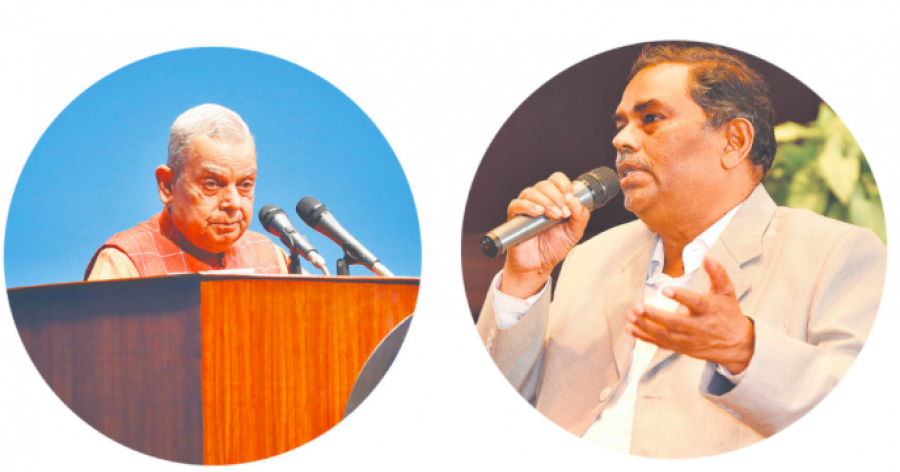National
Poll commission’s decision on Janata Samajbadi Party row expected today
Upendra Yadav faction is most likely to get party’s name and election symbol.
Tika R Pradhan
With the Supreme Court refusing to intervene in the dispute in the Janata Samajbadi Party, whose two rival factions are claiming the ownership of the party at the Election Commission, the Upendra Yadav-led faction is likely to get the party’s name and election symbol on Monday.
On July 22 the five-member bench of the Election Commission led by its Chief Election Commissioner Dinesh Thapaliya had decided to award the party’s name and symbol to the faction that commands the majority on the basis of the headcount of the members of its executive committee.
“We will wait until 5pm for a headcount and give our decision by 6pm Monday,” said one of the five election commissioners of the bench formed to settle the dispute on condition of anonymity. “The Supreme Court has refused to issue an interim order and therefore we will continue with our process to come up with a decision.”
Since the faction led by chair Yadav has more than 30 executive committee members in the 51-strong committee, it will get the party’s name and election symbol once he proves majority, as per legal provisions.
A day after the July 22 decision of the Election Commission another chair of the party, Mahantha Thakur, had knocked the door of the Supreme Court demanding that the decision of the commission be scrapped and an interim order be issued not to implement it.
However, on Sunday, a single bench of Justice Kumar Regmi refused to issue an interim order to the commission thus allowing the poll body to continue its process to come up with its decision.
“As it is deemed necessary to decide on whether the said decision will cause irreplaceable damage to the writ petitioner from the point of view of constitutional dignity as well, schedule the next hearing for July 30 and inform both the parties to be present for discussions to decide whether to issue an interim order or not,” the bench ordered.
But the Supreme Court administration said with the refusal of the apex court to issue an interim order or interlocutory interim order the Election Commission can continue with its decision.
“Now it’s up to the defendants whether to continue with their decision after the Supreme Court refused to issue an interim order,” said Baburam Dahal, spokesperson of the Supreme Court.
Thakur had moved to the court demanding that the Election Commission’s decision to give the authenticity of the party to the faction that commands the majority in the party’s 51-member executive committee be quashed and a mandamus order be issued to quash Yadav’s petition at the commission. Thakur had claimed that he had restructured the executive committee of the party in his capacity as the first chair of the party on May 16.
Thakur had made the Election Commission and Yadav as defendants.
Janata Samajbadi Party was formed at midnight on April 22 two days after the then Prime Minister KP Sharma Oli brought an ordinance making it easier for parties to split, aiming to break up the then Thakur-led Rastriya Janata Party and Yadav-led Samajbadi Party.
The 19 of the 32 lower house lawmakers of the Yadav faction and 32 of the 51 executive committee members on Sunday evening gathered at a resort in Godavari, Lalitpur for, ostensibly, political training and discussion but, according to insiders, to ensure they do not defect to the Thakur faction.
Analysts had labelled the merger as an artificial one and it was only a matter of time before it split to its constituent parts.
“The split will certainly send a negative message to the Madhes,” said Vijay Kant Karna, a political analyst and former ambassador to Denmark. “Oli prompted their unity and it was Oli who forced them to split.”
Karna said the Thakur-led faction had contested the last election as Rastriya Janata Party and they will most probably go for that name after the Election Commission’s decision.
The conflict between the two factions came to a head when the Thakur-led faction decided to support the Oli government after the Supreme Court reinstated the House of Representatives on February 23 following its first dissolution on December 20 last year.
Oli even addressed some of the party’s demands like withdrawal of cases against those involved in the 2015 Madhes uprising in the run-up-to the promulgation of the constitution and inducted several ministers from the Thakur faction in the Council of Ministers.
The Yadav-led faction, on the other hand, was hell-bent on unseating Oli claiming that he was trying to derail the constitution and was part of the opposition alliance of Nepali Congress and Communist Party of Nepal (Maoist Centre) and Madhav Nepal-led faction of Oli’s party CPN-UML.
On July 6, the Election Commission had invited both factions in an attempt to find ways for a possible patch-up but both sides agreed to part ways instead and signed a document allowing the commission to take decisions as per the existing legal provisions.
According to Election Commissioner Ishwari Prasad Poudyal, as per the legal provision the faction proving a majority in the party’s central committee will get the party’s name and everything associated with it and the other faction can register a new party if it wishes to do so.
Clause 44(6) of the Political Parties Act-2017 states that the commission can award the authenticity to the faction with a majority in the central committee that existed before the conflict arose and allow the other faction to register a new party.
“We will decide as per the law. The faction proving a majority will get the party while the other faction can register another party if they want,” said Poudyal.




 8.43°C Kathmandu
8.43°C Kathmandu














